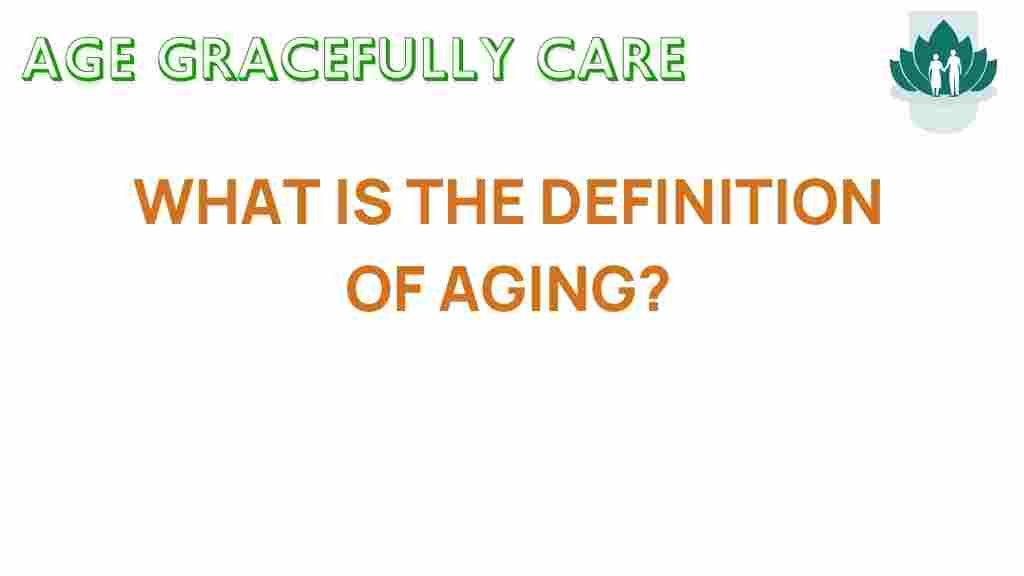Aging: What It Really Means for Our Lives
Aging is a universal experience that every living being undergoes, yet it remains one of the most misunderstood processes in life. As we delve into the intricacies of aging, we come to realize that it encompasses a range of biological, psychological, and social changes. Understanding the definition of aging and its implications can help us navigate our lives more effectively as we grow older. In this article, we will explore the various dimensions of aging, including human lifespan, longevity, age-related changes, biological aging, life expectancy, health span, and the field of gerontology.
The Definition of Aging
Aging can be defined as the gradual process of becoming older, characterized by a decline in physiological function and an increased risk of disease and death. This process is influenced by numerous factors including genetics, environment, lifestyle, and even psychological aspects. Some key definitions related to aging include:
- Biological Aging: The physiological changes that occur in the body over time.
- Life Expectancy: The average period a person is expected to live, which varies by demographics and health.
- Health Span: The period of life spent in good health, free from chronic diseases.
- Gerontology: The study of aging and the challenges and issues that elderly individuals face.
Human Lifespan and Longevity
The concept of human lifespan refers to the maximum age that a human can live, which is currently estimated to be around 120 years. Longevity, on the other hand, focuses on the factors that contribute to a long life, including:
- Genetics
- Diet and Nutrition
- Physical Activity
- Social Connections
- Mental Well-being
Research in the field of gerontology studies these aspects to uncover how they can be optimized for a longer, healthier life.
Age-Related Changes
As we age, our bodies undergo numerous changes that can affect our health and quality of life. Some of the most common age-related changes include:
- Skin Changes: Loss of elasticity, dryness, and wrinkles.
- Muscle Mass Decrease: Sarcopenia, or loss of muscle mass, which affects strength and mobility.
- Bone Density Loss: Increased risk of osteoporosis and fractures.
- Cognitive Decline: Changes in memory and cognitive function, which can lead to conditions like dementia.
- Cardiovascular Changes: Increased blood pressure and changes in heart function.
Understanding Biological Aging
Biological aging is a complex process driven by both genetic and environmental factors. It is characterized by:
- Cellular Aging: Telomere shortening and cellular senescence.
- Oxidative Stress: Damage caused by free radicals, leading to cellular dysfunction.
- Inflammation: Chronic low-grade inflammation, also known as “inflammaging”.
These biological changes can lead to various age-related diseases, making it crucial to adopt healthy lifestyles to mitigate their effects.
Life Expectancy vs. Health Span
While life expectancy refers to the number of years a person can expect to live, health span focuses on the quality of those years. It is possible to live a long life while experiencing chronic illnesses, which emphasizes the importance of maintaining a good health span. Some strategies to enhance your health span include:
- Regular physical activity
- A balanced diet rich in nutrients
- Mental exercises and social engagement
- Regular health screenings and preventive care
For more information on maintaining a healthy lifestyle, you can visit this resource.
Longevity and Lifestyle Choices
Various studies in gerontology have highlighted the significant impact of lifestyle choices on longevity. Here are some key lifestyle changes that can promote longer, healthier lives:
- Diet: A Mediterranean diet rich in fruits, vegetables, whole grains, and healthy fats is linked to longevity.
- Exercise: Regular physical activity, including strength training and aerobic exercises, improves both lifespan and health span.
- Stress Management: Practices such as meditation, yoga, and deep breathing exercises can reduce stress, which is beneficial for aging.
- Social Connections: Maintaining strong relationships and social networks is crucial for emotional health and longevity.
Common Myths About Aging
Despite the wealth of information available, several myths about aging persist. Some common misconceptions include:
- Aging Equals Decline: While aging brings changes, it does not always mean a decline in quality of life.
- Older Adults Are Depressed: Although depression can occur, many older adults lead fulfilling and joyful lives.
- It’s Too Late to Change: It’s never too late to adopt healthier habits that can improve quality of life.
Tips for Healthy Aging
To navigate the aging process successfully, consider the following tips:
- Stay Active: Aim for at least 150 minutes of moderate exercise each week.
- Eat Well: Focus on a balanced diet with plenty of fruits, vegetables, and whole grains.
- Keep Learning: Engage in activities that challenge your mind, such as puzzles, reading, or learning new skills.
- Regular Check-ups: Visit your healthcare provider for regular screenings and preventive care.
- Connect with Others: Foster relationships with family and friends to maintain emotional health.
Conclusion: Embracing Aging
Aging is an inevitable part of life, but understanding its nuances can empower us to embrace it fully. By focusing on healthy lifestyle choices and staying informed about the biological and psychological aspects of aging, we can enhance both our lifespan and health span. As we continue to unravel the mysteries of aging, let’s change the narrative from one of decline to one of growth, resilience, and fulfillment.
For those interested in exploring the field of gerontology further, consider looking into educational programs or resources that focus on aging studies. The more we learn, the better equipped we will be to enjoy the journey of life at every age.
This article is in the category Health and created by AgeGracefullyCare Team
